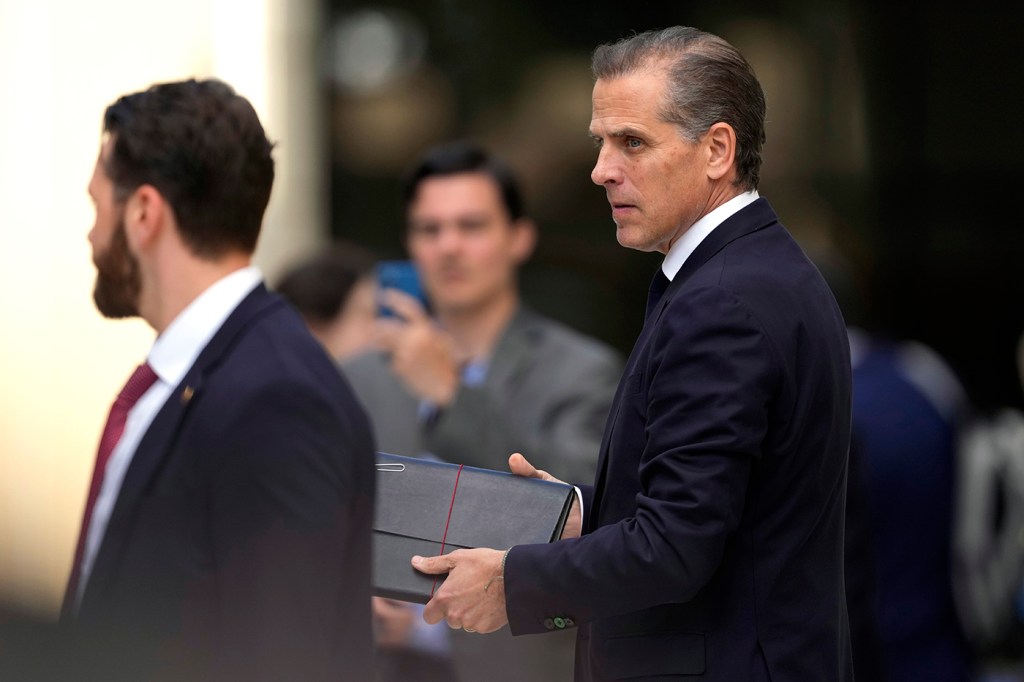Hunter Biden was convicted on three felony gun charges. What might it mean for his father’s presidential bid?
A Northeastern political scientist says many voters have already locked in their votes, but that the 2024 election will still be closely contested.

Last month, for the first time in U.S. history, a former president became a convicted felon.
Now, the son of a sitting president has been convicted on federal gun charges — another historic first for a nation in the middle of an election year.
Hunter Biden was convicted Tuesday on charges that he lied on a federal screening form about his drug use, lied to a gun dealer and possessed a firearm. The case was brought by special counsel David C. Weiss, appointed by Attorney General Merrick B. Garland.
Deliberating for only three hours, a jury found Biden, 54, guilty of three felonies: making a false statement tied to a firearms sale; making a false statement linked to a transaction record; and illegal possession of a firearm.
With the general election just months away, how might Biden’s conviction impact his father’s bid for reelection?
“Juxtaposed against the recent [Donald] Trump conviction, it may help Biden in the end because it suggests that the system is not rigged, as Trump is arguing,” says Costas Panagopoulos, head of Northeastern’s political science department. “The two convictions only reinforce the fact that the judicial system is working — and the notion that no one is above the law.”
The president told ABC News last week that he wouldn’t pardon his son. In a statement after the verdict, the president said: “I will accept the outcome of this case and will continue to respect the judicial process as Hunter considers an appeal.”
All in all, Panagopoulos says he doesn’t think the conviction will hurt the president’s chances come November.
“The fact that [Joe] Biden has indicated that he will not pardon his son only strengthens the president’s commitment to the rule of law, and represents a sharp contrast to Trump’s attacks on the judicial system and his disdain for playing by the rules,” Panagopoulos says.
What happens next?
For first-time offenders, the sentencing guidelines for such crimes stipulate 15 to 21 months of potential prison time — although, on paper, Hunter Biden faces a maximum of 25 years in prison for the three charges.
“Since it is a first-time nonviolent offense, I doubt he will be sentenced to prison — although the fact that it involved lying on an application for a gun license perhaps makes it slightly different than lying on other types of applications,” says Daniel Medwed, Northeastern distinguished professor of law and criminal justice.
Featured Posts
Medwed says the decision to prosecute the president’s son may speak to public concerns surrounding the prosecution of politicians or members of their families — concerns best captured in Republican-led arguments that the U.S. has a “two-tiered” justice system.
“It seems like an odd use of government resources to take a case like this to trial, and I suspect the desire of the DOJ to appear independent and nonpartisan played a significant role in the backroom conversations about whether to proceed,” Medwed adds.
Indeed, prosecutions for lying on gun applications do appear to be rare. Of more than 112,000 people who were found to have lied on the form while purchasing a gun in fiscal 2017, only 12 were prosecuted, according to a Government Accountability Office report.
It had looked like Biden would avoid prosecution on the gun charges; a plea deal had apparently been reached last year in which Biden would plead guilty to misdemeanor tax offenses, and prosecutors would recommend two years of probation. There was also an agreement that Biden would not be prosecuted on felony gun charges as long as he stayed out of trouble for two years.
However, federal judge Maryellen Noreika questioned the agreement and the deal unraveled. Later, Garland named Weiss as special counsel and a grand jury indicted Biden on the gun charges.
Medwed says Biden’s success on appeal is unlikely, adding: “He has a right to appeal and almost certainly will exercise that right, but the evidence seemed pretty ironclad.”
Biden’s conviction comes less than two weeks after former President Donald Trump was convicted in New York of falsifying business records in connection with a hush-money payment made to porn star Stormy Daniels to cover up a sex scandal. A jury found Trump guilty on all 34 counts.
Panagopoulos says many voters have already locked in their votes, but that the 2024 election will still be closely contested. “There are still undecided voters who could be pivotal,” he says.











